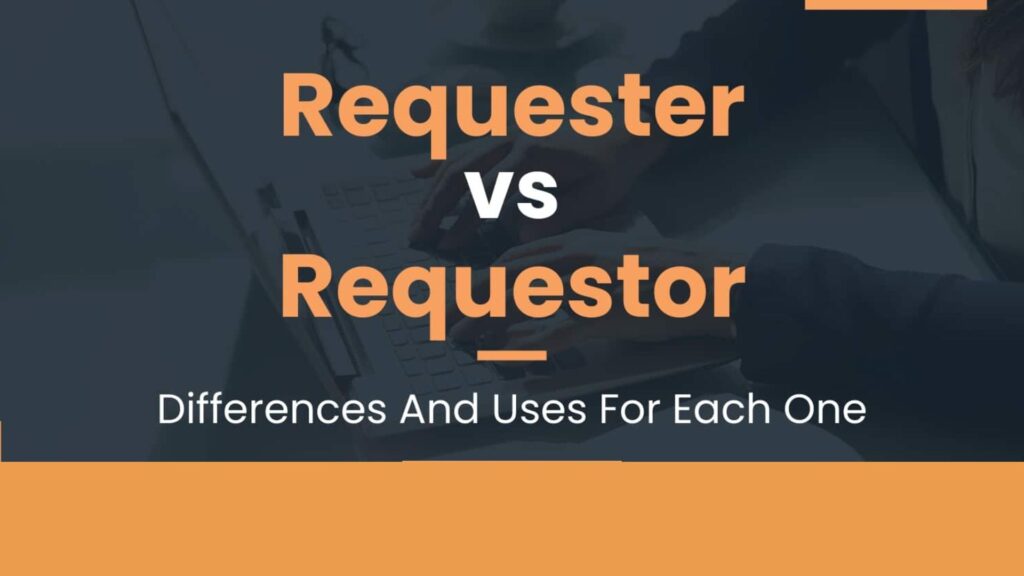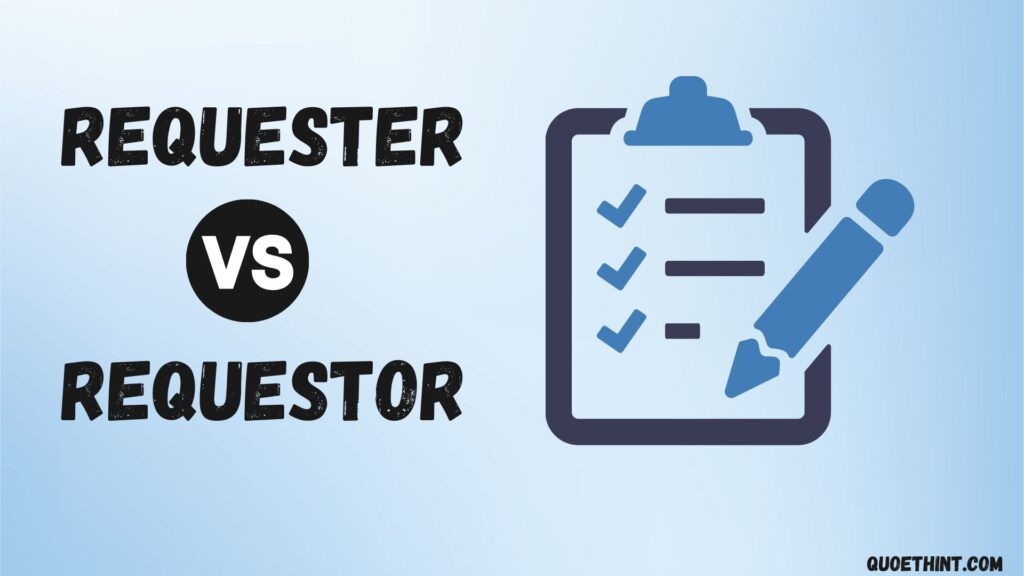Have you ever paused mid-email, wondering if you should type requester or requestor? Both seem correct, yet something feels off when you pick one. If you’ve faced this dilemma, you’re not alone.
In this article, we’ll break down the difference between requester and requestor, explore when to use each spelling, and give you clear rules, scenario examples, and a quick reference table so you never second-guess again.
Keyword + Intro Explanation

Both requester and requestor stem from the verb request, meaning to ask for something formally or politely. They both refer to someone who makes a request, but the spelling difference isn’t random it’s tied to context-specific usage, industry norms, and stylistic choice.
Simple Definition + Usage Overview
- Requester: The standard and most widely accepted spelling in American English and British English for general communication, business writing, and informal contexts.
- Requestor: A less common variant often used in legal documents, technical fields, and procurement systems.
Both are correct, but their frequency and formality differ.
Clear Rules & Patterns
✅ When to Use “Requester”
- Everyday emails or general correspondence
- Business settings without strict legal requirements
- Formal writing outside technical contexts
✅ When to Use “Requestor”
- Legal documents such as court records or contracts
- Procurement and approval forms in corporate workflows
- Computer programming, API documentation, or IT systems
Bulleted Rules with Do’s and Don’ts
Do’s
- Do use “requester” in most communication for simplicity and clarity.
- Do check your company style guide if you work in law, procurement, or IT.
- Do remain consistent throughout the document.
Don’ts
- Don’t assume one spelling is wrong both are correct in the right context.
- Don’t mix both terms in the same message.
- Don’t use “requestor” casually unless your industry requires it.
Multiple Example Sentences
- Requester: The requester asked for expedited processing of the report.
- Requestor: The requestor must authenticate using a valid token before accessing the API.
- Requester: Please send the final invoice to the requester for approval.
- Requestor: The requestor in the legal filing submitted all supporting evidence.
Scenario Examples (Emails & Contexts)
Example 1: Everyday Business Email (Requester)
Subject: Report Approval Needed
Hi Natalie,
The requester for the annual budget report wants to confirm if all figures have been audited. Please review and respond by Thursday.
Thanks,
Ethan
Example 2: Procurement System (Requestor)
Subject: Purchase Order Verification
Dear Mr. Ramirez,
Our system lists you as the requestor for PO #1129. Please verify the vendor details and submit your confirmation by COB.
Regards,
Sophia
Procurement Officer
Example 3: IT Workflow (Requestor)
Subject: API Access Approved
Hi Lucas,
Your API key request has been processed. The requestor credentials have been generated and sent to your secure email.
Best,
Karen
Example 4: Legal Contract (Requestor)
Clause Example:
The requestor shall submit certified identification documents prior to contract execution.
Common Mistakes & Fixes

Mistake 1: Using requestor in informal communication.
✅ Fix: Use requester unless legal or technical language requires otherwise.
Mistake 2: Assuming requestor is wrong.
✅ Fix: It’s correct, but typically for specialized legal contexts and technical documentation.
Mistake 3: Switching between both in one document.
✅ Fix: Pick one spelling and stick with it for consistency.
Quick Reference Table
| Context | Preferred Spelling |
|---|---|
| General English | Requester |
| Business settings | Requester |
| Legal documents | Requestor |
| Procurement / Approval forms | Requestor |
| Computer programming / APIs | Requestor |
Origins of Both Words
The word requester traces back to Middle English, influenced by the Old French “requeste” and the Latin root “requaerere”, meaning to seek or ask.
Requestor, on the other hand, appeared later, gaining popularity in specialized usage especially in legal writing and IT systems, where precision is key.
Requester vs Requestor in Legal and Technical Contexts
- Legal documents often use requestor because it aligns with long-standing legal phrasing. For instance, in court records, a requestor is the individual formally applying for an order or record.
- Technical fields like API development use requestor to describe the entity initiating a request. Example: The requestor must include an authentication token in the header.
Synonyms for Requester/Requestor
If you want to avoid repetition or need alternatives:
- Applicant
- Petitioner
- Inquirer
- Seeker
- Claimant
- Proposer
- Solicitor
- Pleaser (in legal jargon)
- Candidator
Final Thoughts
So, which one should you choose requester or requestor?
If you’re writing an email, preparing a report, or drafting business communication, use requester. It’s standard, familiar, and clear. But if your work involves legal language, procurement systems, or IT protocols, then requestor may be the right choice.
When in doubt, check your industry norms or company style guide and always stay consistent. The difference is subtle, but getting it right shows attention to detail.
Bugti is the founder of Quoethint.com, a hub for English language tips, writing advice, and grammar guidance. With years of experience in English studies and a passion for clear communication, Bugti created this platform to make grammar and writing easy to understand for everyone.
